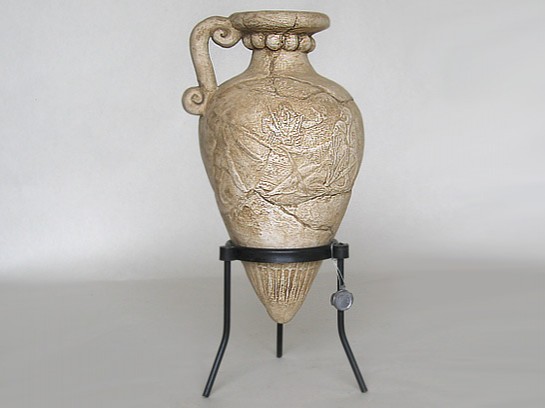In Greek mythology Achilles was a hero of the Trojan War, the central character and greatest warrior of Homer's Iliad, which takes for its theme, not the War of Troy in its entirety, but specifically the Wrath of Achilles.
Later legends (beginning with a poem by Statius in the first century AD) state that Achilles was invulnerable on all of his body except for his heel. These legends state that Achilles was killed in battle by an arrow to the heel, and so an Achilles' heel has come to mean a person's only weakness.
Achilles is also famous for being the most 'handsome' of the heroes assembled at Troy, as well as the fleetest. Central to his myth is his relationship with Patroclus, characterized in different sources as deep friendship or love.
Achilles was the son of the immortal Peleus, king of the Myrmidons in Troy (southeast Thessaly), and the sea nymph Thetis. Zeus and Poseidon had been rivals for the hand of Thetis until Prometheus, the food-bringer, warned Zeus of a prophecy that Thetis would bear a son greater than his father. For this reason, the two gods withdrew their pursuit, and had her wed to Peleus. As with most mythology there is a tale which offers an alternate version of these events in Argonautica (iv.760) Hera alludes to Thetis' chaste resistance to the advances of Zeus, that Thetis had been so loyal to Hera's marriage bond that she coolly rejected him.
According to the incomplete poem Achilleis written by Statius in the first century AD, and to no other sources, when Achilles was born Thetis tried to make him immortal by dipping him in the river Styx. However, she forgot to wet the heel she held him by, leaving him vulnerable at that spot. (See Achilles' heel, Achilles' tendon.) It is not clear if this version of events was known earlier. In another version of this story, Thetis anointed the boy in ambrosia and put him on top of a fire to burn away the mortal parts of his body. She was interrupted by Peleus and abandoned both father and son in a rage.
However none of the sources before Statius makes any reference to this invulnerability. To the contrary, in the Iliad Homer mentions Achilles being wounded: in Book 21 the Paeonian hero Asteropaeus, son of Pelegon, challenged Achilles by the river Scamander. He cast two spears at once, one grazed Achilles' elbow, "drawing a spurt of blood."
Also in the fragmentary poems of the Epic Cycle in which we can find description of the hero's death. Aithiopis by Arctinus of Miletus, Ilias Mikrà by Lesche of Mytilene, Iliou persis by Arctinus of Miletus, there is no trace of any reference to his invulnerability or his famous (achilles) heel in the later vase-paintings presenting Achilles' death, the arrow (or in many cases arrows) hit his body.
Product Details
Code: 093
Dimensions: 11x19cm
Colors: White, Black, Brown
